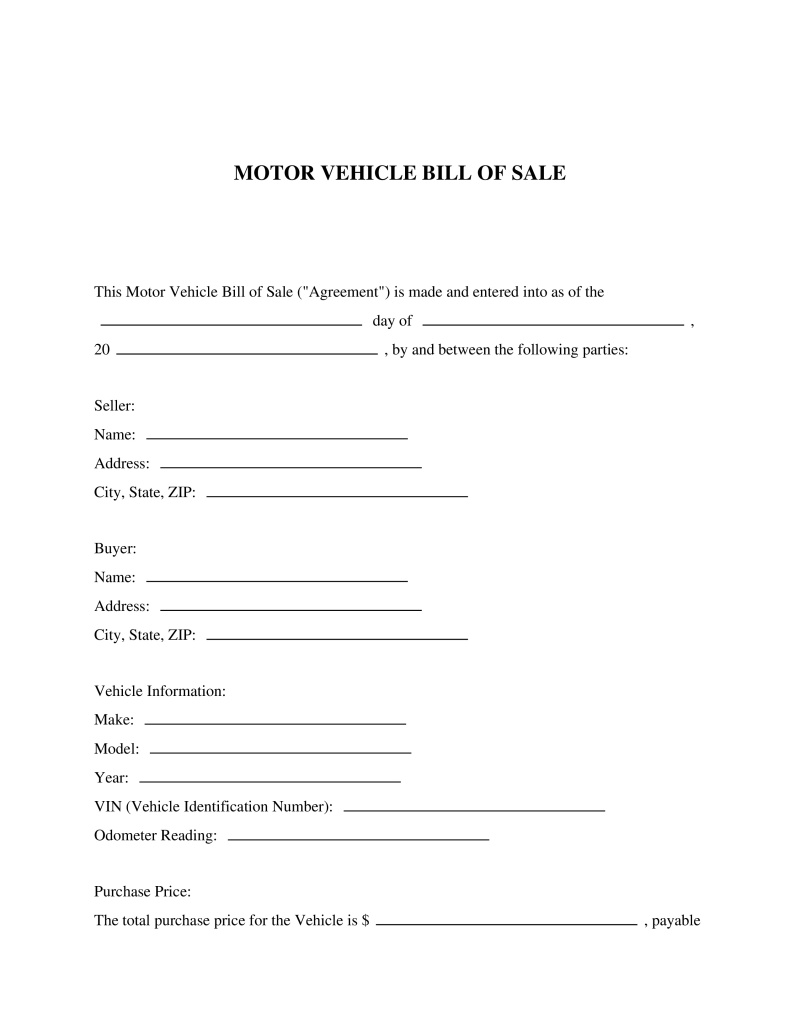What is a Motor Vehicle Bill of Sale?
A Motor Vehicle Bill of Sale, often referred to as an MVA Bill of Sale, is a crucial legal document that is primarily used during the sale and purchase of a vehicle. The document provides written evidence of the details surrounding the transaction, including the identity of the buyer and seller, the sale price, and the specific details about the vehicle, such as its make, model, and identification number.
Key features of this document include:
- Seller's and buyer's names and contact information.
- Description of the vehicle being sold (including make, model, year, and VIN).
- The agreed-upon sale price.
- Disclosure of any known damage or defects.
- Date of sale and ownership transfer.
When You'll Need This Document
The MVA Bill of Sale becomes handy in several scenarios, including:
- When you are selling your car to a private party: It outlines the terms of the sale and protects you from future disputes.
- As a buyer of a used vehicle: It provides proof of purchase and is often required to register the vehicle under your name.
- For tax purposes: The document can be used as a record for calculating the sales tax.
Ideal Users of a Motor Vehicle Bill of Sale
The main parties that benefit from this legal form include:
- Sellers of a motor vehicle: They can clearly outline the terms of the sale and limit future liability.
- Buyers of a motor vehicle: They receive proof of ownership and can ensure the vehicle matches the seller's description.
- DMV Offices: The MVA Bill of Sale is often necessary for changing the vehicle's title and registration
Legal Protection Offered by The MVA Bill of Sale
The legal significance of the Motor Vehicle Bill of Sale lies in its ability to provide:
- Proof of ownership: It serves as a receipt for the transaction.
- Documentation of details: It protects both parties if disagreements or disputes arise later.
- Reduction of liability: For sellers, it can help establish that they are no longer responsible for what happens to the vehicle after the sale.
Examples of Use Cases for MVA Bill of Sale
- Joe sells his 2008 Honda CRV to his neighbor, Alice, for $5,000. They detail the terms of their agreement in an MVA Bill of Sale.
- The DMV requires Sam to provide a Motor Vehicle Bill of Sale to register the Ford Mustang he purchased from a private seller.
- Linda bought a car for her son as a graduation present. The MVA Bill of Sale was used to transfer the vehicle's ownership to her son's name.
FAQs
About this document
A Motor Vehicle Bill of Sale is a legal document recording the sale details of a vehicle, including buyer, seller, price, and vehicle specifics.
This document utilizes our advanced PassTheBar AI technology, ensuring bar-exam precision and comprehensive legal coverage.
This document is designed to comply with the laws of all 50 states.
Community Discussion
Share your experience and help others
Legal Notice: Comments are personal opinions and do not constitute legal advice. Always consult a qualified attorney for matters specific to your situation.

Comments (0)
Leave a Comment
No comments yet. Be the first to comment!